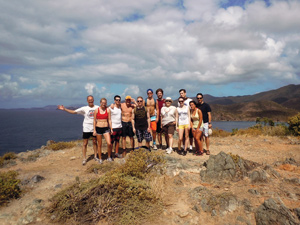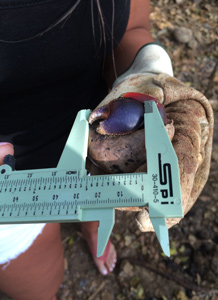 Opportunities for undergraduate research abound at Manhattan College and beyond. Acting as both mentors to their students, as well as collaborative partners, many professors in hands-on fields go the extra mile — or the extra thousand — to help their students learn.
Opportunities for undergraduate research abound at Manhattan College and beyond. Acting as both mentors to their students, as well as collaborative partners, many professors in hands-on fields go the extra mile — or the extra thousand — to help their students learn.
When he’s not teaching in Riverdale or researching at AMNH, Shockey is bringing Manhattan students to field sites in Wyoming and Bolivia to study paleontology.
Colleague Lance Evans, Ph.D., professor of biology, has taken similar trips with students to Argentina and Chile to study the effects of sunlight and the xylem conductivity on different species of cacti. Ultimately, the students play an integral role in Evans’ continuing research on the effects of global warming; helping him to package samples and record data for future publication.
While these field trips aren’t necessarily tied to specific classes, they present unique collaborative research opportunities for students whose intellectual curiosity takes them out of the lab and into the field.
And the field doesn’t have to be a field at all. It can be an ocean, a jungle or a cavern.
In BIO 409: Marine Biology, taught by biology professor Michael Judge, Ph.D., it’s all three.
Judge packages his scheduled three-hour-a-week lab time into a seven-day outdoor adventure for students in the U.S. Virgin Islands, complete with snorkeling excursions in the bay, boating trips off-shore, and hikes to nearby bat caves.
The cohort stays and works at the Virgin Islands Environmental Resource Station (VIERS) in St. John. And the intention of the field studies are not just to observe different species and habitats than what are found in New York but also to practice the process of designing a research project on-site.
“Unlike following a lab manual, the students can ask questions and design their own procedures,” Judge says. “Essentially, they become the experts of an unpublished topic.”
This year, the projects ranged from an examination of land hermit crabs and the speed at which they move, to the territoriality of the damselfish, to the way a reef squid reacts to threats in its environment.
“I personally like to learn visually and, therefore, loved this trip,” says biology major Gabriella Fava ’15. “Being able to see everything and learn hands-on was more interesting. We got to see and learn things we could not experience in a classroom.”
Photos courtesy of Michael Judge and Gabriella Fava